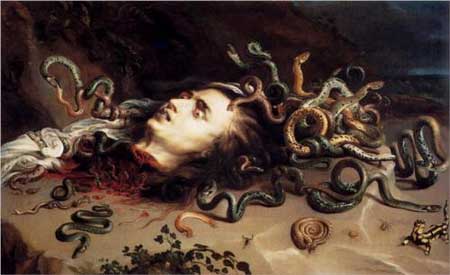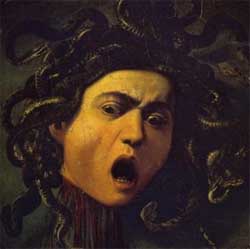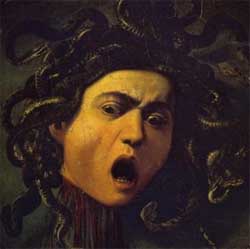
The sisters three, the Gorgons, have their haunt; Winged forms, with snaky locks, hateful to man, Whom nothing mortal looking on can live. – Prometheus Bound by Aeschylus
Considered demons of the underworld or of the sea, the Gorgons, whose name means ‘savage/ horrible,’ were the daughters of Phorcys and Ceto. They had feminine bodies covered with scales and hair of vipers, and whoever that looked at them would be instantly turned to stone. The Gorgons consisted of Medusa (“ruler”), the most infamous of the three and the only mortal one. Her sisters, who were both immortal, were named Sthenno (“forceful”) and Euryale (“far-roaming”).
And again, Ceto bare to Phoreys the fair-cheeked Graiae, sisters grey from their birth: and both deathless gods and men who walk on earth call them Graiae, Pemphredo well-clad, and saffron-robed Enyo, and the Gorgons who dwell beyond glorious Ocean in the frontier land towards Night where are the clear- voiced Hesperides, Sthenno, and Euryale, and Medusa who suffered a woeful fate: she was mortal, but the two were undying and grew not old. With her lay the Dark-haired One (14) in a soft meadow amid spring flowers. And when Perseus cut off her head, there sprang forth great Chrysaor and the horse Pegasus who is so called because he was born near the springs (pegae) of Ocean; and that other, because he held a golden blade (aor) in his hands. – Hesiod, Theogeny (ll 270-294)

According to legend, Polydectes told Perseus that he would rather have the head of a Gorgon more than anything in the world. When he announced he was getting married, Perseus declared he would bring back one of their heads as a present. Hermes met Perseus during his journey and gave him a sword that wouldn’t be bent or broken by Medusa’s scales. Pallas Athena also aided Perseus by giving him her shield of polished bronze and told him to use the shield as a mirror so he could see Medusa. Perseus found the Gorgons asleep, and after Hermes and Athena had told him which one was Medusa, he cut off her head.
And at the Gorgon-seats arriv’d at last:
But as he journey’d, pensive he survey’d,
What wasteful havock dire Medusa made.
Here, stood still breathing statues, men before;
There, rampant lions seem’d in stone to roar.
Nor did he, yet affrighted, quit the field,
But in the mirror of his polish’d shield
Reflected saw Medusa slumbers take,
And not one serpent by good chance awake.
Then backward an unerring blow he sped,
And from her body lop’d at once her head.
The gore prolifick prov’d; with sudden force
Sprung Pegasus, and wing’d his airy course.
– Metamorphosis: Book 4 by Ovid











 Glasya-Labolas
Glasya-Labolas